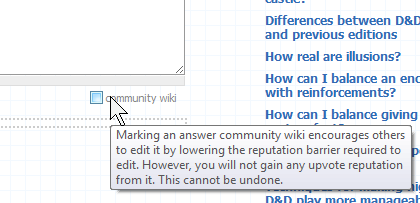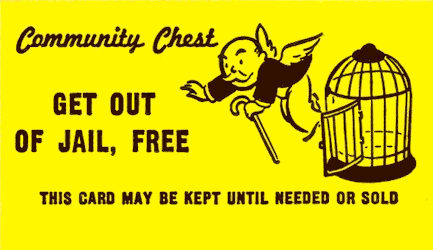When you mark a post community wiki on a Stack Exchange site, that means …
- this post can be edited by anyone with 100 reputation
- this post does not generate any reputation for anyone when upvoted or downvoted

The main advantage of community wiki -- more editing -- was nerfed when we introduced suggested edits. With suggested edits, anyone, even an anonymous user, can edit anything -- so long as another experienced user reviews and approves their edit.
This leaves many wondering -- what's the point of Community Wiki?
Community Wiki is not for Fun
With suggested edits now in place, you could argue that the removal of reputation from voting is now the only function of community wiki. Unfortunately, this means it is often seen as a magic switch to allow questionable content.
One of the first feature requests I saw on Meta Stack Overflow was Moderator Filtering of Highest Voted Questions, which was deemed necessary because questions like Coolest Server Names show the wrong side of the site. The actual problem-solving nature of sites is too easily buried under the weight of all these "fun" community wiki questions. At one point, "Our top voted post is an actual question!" was a point of pride. That's … not a positive sign for a Q&A network.

Even when divorced from reputation, votes are hugely important. Something with a lot of votes means "this is what we deem quality content", and votes are how we differentiate between answers when there is no single definitive answer. Community wiki should never be used as a get out of jail free pass for joke and fun questions. It may succeed in preventing any single individual from gaining reputation for posting a cartoon or joke, but the question will remain on the site. And it will now and forever be one of the top questions by votes, advertised to the world as one of the top rated things on your site.
Is that what you really want?
Community Wiki is not a "Quick Fix"
Community wiki isn’t only abused for “fun” or “getting-to-know-you” stuff, though. Many sites propose using community wiki to allow content that is on-topic and useful, but can be considered borderline or questionable in other ways. Someone notes that a certain class of question has problems, and proposes using community wiki as a quick fix.
If a question is valuable enough that you believe it belongs on the site, chances are you don't need it to be community wiki! We welcome all contributions which improve the quality of a site and advertise its greatness to the rest of the world. If you allow a certain class of questions, but only under the stipulation that no one can earn reputation from them, you've strongly discouraged these sorts of questions. People aren't going to put in nearly as much effort to ask them.
Instead, strive for quality. If you're unsure a certain question class belongs on the site, don't tolerate the worst examples -- demand that these questions be awesome. Questions shouldn't be swept under the rug with community wiki; they should get the same respect and treatment as the rest of your Q&A. If those questions are something you are uncomfortable showing to visitors … they probably don't belong on your site.
Many things which "need" to be community wiki simply don't. Sometimes it's just a matter of understanding the root of a question: "Software to record video games" can be turned into a great question without needing the crutch of community wiki. Or, you may need to break the original question into smaller parts; a rather well-timed Ask Different Meta post explores this very avenue.
I'm relatively new here, but the examples of 'community wiki' that I've seen so far seem to be actively detrimental to the web site. For example, the 'What Lion bugs irritate you the most?' thread takes lots of good questions and answers that could (should?) be individually placed on the main page and effectively hides them in a single thread.
Detrimental indeed. Community wiki abuse includes its ability to mask or devalue important quality content just as often as it involves the presence of low quality content.
Sometimes you have content which is valuable and on-topic, but is perhaps a bit too popular. It runs the risk of overwhelming the rest of your site if it grows untamed. In these circumstances, community wiki can be a way to preserve the value of these posts while stifling their growth. Keep in mind, though, that in using community wiki to stifle growth, you should actually follow through with it -- a site should never have more than one community wiki question for every hundred questions. Having too many community wiki questions defeats the entire purpose.
Community Wiki is primarily for Answers
If we haven't said this enough already, questions rarely, if ever, need community wiki. What about answers? We removed the ability for users to make a question community wiki, but left the ability for users to make an answer wiki.
The intent of community wiki in answers is to help share the burden of solving a question. An incomplete "seed" answer is a stepping stone to a complete solution with help from others; an incomplete question is a hindrance and an obstacle to getting a solution as no one understands the inquiry. It is in answers that the goal of community wiki, for the community, by the community, shows its truest colors.
Yet even in answers, true collaboration is scarce. Most of the time, a single individual can provide a complete answer. There are even times where a question looks like it'll need a massive effort, but one gallant user steps up to the plate with an impressive and comprehensive answer.
Community Wiki is dead. Long live Community Wiki!
Most of the time, you should be asking yourself "How can I improve this post so that community wiki isn't needed?" Community wiki is like a cheese knife: it is a specialized tool to be used sparingly.

Community wiki is for that rare gem of a post that needs true community collaboration. That's when community wiki shines. If your site is teeming with community wiki posts -- particularly in questions -- you should consider the above points carefully.